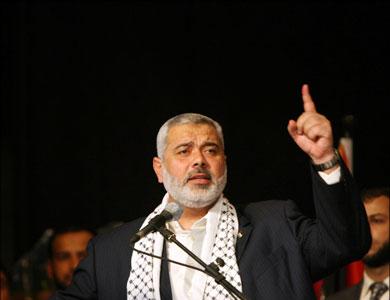
By Fahmi Shurrab
Many reports have recently surfaced that Hamas intended to establish an independent and sovereign state in Gaza. It was also reported extensively in Fatah’s media that Hamas seems to be working towards establishing an independent state of its own in the Gaza Strip.
Actually, nobody doubts that Hamas still has a powerful grip over the Gaza Strip, but it faces an increasing crisis. Hamas undoubtedly could have avoided many accusations and criticisms if it refused to form a government from the beginning in 2006 and stayed out of authority. In politics, rival parties or factions, are not a part of the “Idealist Approach” in the field of international relations, particularly, in Arab states. They don’t practice genuine democracy nor do they accept each other and live in peaceful co-existence. Mostly the outcomes of the electoral process are the cause of crisis.
In Arab states, fighting for power and authority leads to all kinds of lies and tricks. Lies come with a cover of religious justifications.
The ex-president of Yemen Ali Abdullah Saleh has devoted his life in the last few years fighting the Houthis but after he was ousted from power, due to the outcomes of the Arab Spring, he allied with his past enemies to fight his people and his past army, all for the sake of authority.
Hamas still controls the Gaza Strip and is in power. This will stay as long as the newly formed Palestinian government is not working for all Palestinians and still comes to Gaza as “tourists”. The people in Gaza blame the current government, believing it discriminates between employees. It still doesn’t give salaries to the civilian staff that were employed by the last government ruled by Hamas, which contradicts the agreements signed between the two factions.
Some senior Hamas members such as Dr Mahmoud Zahar and Dr Salah Bardaweel, declared that “there is nothing wrong or shameful about labeling the current situation in the Gaza Strip an authority or administration,” and “if we establish an emirate or state in the Gaza Strip or in any part of Palestine, this would not mean that we are prepared to give up one inch of Palestine.” However, these statements were meant to be “threatening” to encourage the government of Rami Hamdallah to work for all Palestinians, to start the process of rebuilding after the war on Gaza in 2014 and finish the process of integration between the Fatah and Hamas employees.
In my opinion, the so-called purported plan of the “State of Gaza” cannot be true or see the light for many reasons, including:
- Hamas now has no strategic alternatives. It suffers from the siege on Gaza and the negative impact of the counter-revolution, as the changes in Arab regions are not in its favor. Hamas carried a heavy burden when it was in government and is not ready to try it again. On the contrary, having a Fatah government is a lifeline to prevent Hamas from recognizing Israel and avoiding having Qassam members under observation by any foreign power (as per the Quartet’s conditions).
- The idea of creating a separate entity or state in the Gaza Strip is not welcomed by all factions. All in Palestine are aware of the dangerous impact of it and refuse it. The leaders of the differing factions – particularly Fatah – conceive this as a severe blow to the two-state solution and unity among Palestinians.
- The micro-state must fulfill some demands and conditions required by the international community. It cannot recognize Israel and cannot stop the resistance, and if it does so, Hamas will lose its legitimacy before its supporters and members.
- If Hamas wanted to establish a state in Gaza, it could have done so when it was in government with full power, in the time of former Egyptian President Mohamed Morsi.
- The declarations of some senior members of Hamas of establishing a “higher committee” to manage the affairs of Gaza or establishing a “state” are a kind of pressure to convince the national unity government which is fully ruled by President Mahmoud Abbas, to undertake its duties and help the people.
- All Hamas think tanks and centers of strategic studies refuse the idea of establishing a state in Gaza. Brilliant intellectual men in Hamas, such as Dr Ahmed Yusuf, the past adviser of Ismail Haniyeh, the former Palestinian prime minister and former deputy minister of foreign affairs, along with the current leader of Ministry of Foreign Affairs, Dr Ghazi Hamad, are against this idea and working for the success of national reconciliation.
- If Israel has not agreed for Fatah (the secular party) to establish a state within 1967 borders, would Israel agree to Hamas’s forming of one?
The magic solution for Gaza’s crisis is to unite the employees, accelerate the rebuilding process, find new jobs for some of the large numbers of graduates in Gaza, increase the hours of electricity and help open the Rafah border to promote the free movement of people to and from Gaza.
Achieving this can save time and effort, and it will also stop the factions’ media attacks against one another.
– Fahmi Shurrab is a Palestinian writer and university lecturer. He holds a PhD in International Relation. He contributed this article to PalestineChronicle.com.





Hamas is trying all forms of getting somebody’s attention. They are poorer than “church mice”, they have no way of getting out to the rest of the world, Israel’s clamp on water, food, electricity, building goods all keep them and their people in an open jail–as was mentioned last summer. They need to work with PLO/Abbas for domestic needs if nothing else. Until Hamas is taken off the “Terrorist List” little will be done to help them from the Western world. That terror list should not exist in my mind since it keeps groups/countries from neigotiating for not only peace but domestic economics that are needed to keeps a country–or part of one–going.